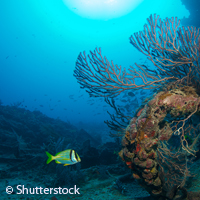Re-emergence of micro algae could play havoc on ocean life
The North Atlantic lost a microscopic plant 800,000 years ago. But a new study reveals the re-emergence of Neodenticula seminae in the area, marking the first trans-Atlantic migration in modern times with respect to plankton. The outcome is part of the CLAMER ('Climate change and marine ecosystem research results') project, which is funded under the Environment Theme of the EU's Seventh Framework Programme (FP7) to the tune of more than EUR 990,000. Researchers propose that shrinking polar ice helped the microscopic plant drift from the Pacific through the Arctic Ocean, effectively providing an open passage across the Pole for the tiny algae. Despite it being a source of food, environmentalists are wary about its return, however. They believe that any changes at the base of the marine food web could trigger an 'attack' on Atlantic ocean life. Scientists from the Sir Alister Hardy Foundation for Ocean Science (SAHFOS) in the United Kingdom caution that 'such a geographical shift could transform the biodiversity and functioning of the Arctic and North Atlantic marine ecosystems'. According to the scientists, the migration of the N. seminae is parallel to the 2010 arrival of a Pacific grey whale spotted off the coasts of Israel and Spain. This whale became extinct from the Atlantic 300 years ago, triggered most likely from over-hunting. Experts postulate that the ice-reduced Arctic permitted the whale to cross into the North Atlantic, from where it then made its way to the Mediterranean Sea. This information is part of a number of reports about the marine life upheaval under way in the North Atlantic due to climate change, with the findings being collected and catalogued by CLAMER. The project is combining the results of nearly 300 EU-funded research projects on climate change, carried out over a period of 13 years in Europe's oceans and near-shore waters, as well as the Mediterranean, Baltic and Black Seas. 'The migrations are an example of how changing climate conditions cause species to move or change their behaviour, leading to shifts in ecosystems that are clearly visible today,' explains Carlo Heip, Director General of the NIOZ Royal Netherlands Institute for Sea Research, and CLAMER project leader. SAHFOS, a CLAMER partner, is currently documenting the change in plankton through the Continuous Plankton Recorder Survey, the planet's most geographically extensive marine biological survey. Their data show that other tiny animals, what experts call copecods, are changing as well. They are putting the food supply of fish in jeopardy, such as cod, herring and mackerel. The team says the changes in plankton life have 'been related to the collapse of some fish stocks' and declines in fish-eating North Sea birds. Studies demonstrate that changes in the composition of marine life are likely to be mixed. While some species could feel an adverse impact, others could thrive, gaining in biodiversity and productivity. 'But most of the impacts are so clearly negative, and the scope of change so potentially huge that, taken together, they constitute brightly flashing warning signals,' Dr Heip says. Other CLAMER partners are from Belgium, Denmark, France, Greece, Ireland, Italy, the Netherlands, Norway, Spain and the United Kingdom.For more information, please visit: Flanders Marine Institute (VLIZ): http://www.vliz.be/en/intro Sir Alister Hardy Foundation for Ocean Science (SAHFOS): http://www.sahfos.ac.uk/ CLAMER: http://www.clamer.eu/ Environment Research in FP7: http://cordis.europa.eu/fp7/environment/home_en.html
Countries
Belgium, Denmark, Greece, Spain, France, Ireland, Italy, Netherlands, Norway, United Kingdom

